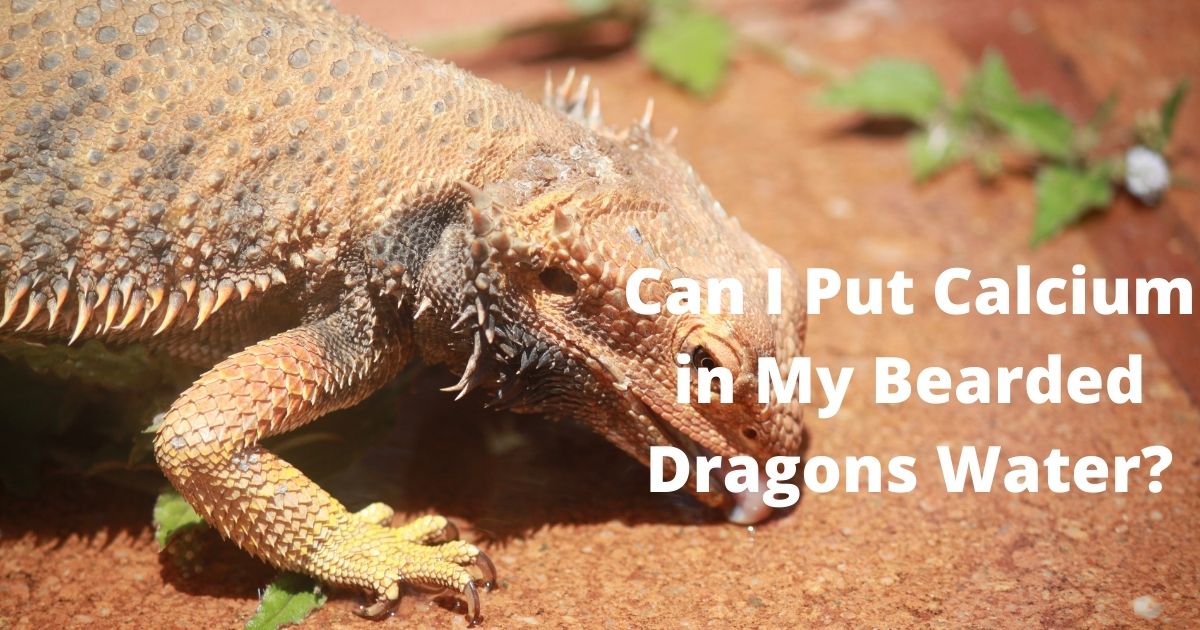As an affiliate, we earn from qualifying purchases on Amazon. We get commissions for purchases made through links in this post.
Bearded dragons should always have a constant supply of calcium in their water. This prevents their bones from getting too soft and brittle, which can cause them to die or cause spinal deformations.
They also need the calcium to help with shedding, because if there is not enough calcium and hydration in the water, they will shed their old skin to make space for new skin underneath.
If a dragon does not have enough calcium, the new skin cannot form and hardens, making it impossible for the dragon to shed its old skin. If you are wondering whether you should add calcium in your bearded dragon’s water, read through to learn more
Can I Put Calcium in My Bearded Dragons Water
Bearded dragons are popular pet lizards that require water for hydration and habitat. But, can i put calcium in my bearded dragons water? Bearded dragons need a calcium-rich diet to maintain healthy bones, but desperate forties often create PH imbalance in the enclosure.
Your bearded dragon needs lots of calcium in its diet and may require supplements, like crushed eggshells or hatching eggs. If you don’t want to spend the money on buying calcium supplements or want your bearded dragon to drink from a bowl, try putting some crushed eggshells into its water container daily.
Adding calcium to your bearded dragon’s water will play a crucial role in their growth. They need calcium to maintain healthy and strong bones as well as help with shedding. Diet high in calcium is recommended for a healthy and happy bearded dragon.

Prolee Reptile Terrarium Tank Large Size
- Pet and Human Safe Materials
- Front & Roof Door With Side Louvers
- Pre-Installed Bulb Sockets With Switches
You May Also Like: Why is My Bearded Dragon Running Around Like Crazy
Do Bearded Dragons Need Calcium
It is a very popular belief among pet owners that bearded dragons, also known as desert monitors, need calcium to help build bones. However, not all reptiles are the same – and bearded dragons are no exception. Tiny holes in their shells make them different from other lizards and reptiles such as snakes and crocodiles – so they need a diet tailored specifically for their needs. They don’t always need supplements or any kind of special treatment for bone care.
The process of bone development begins in the egg – and it should be the only time that bearded dragons require additional calcium. The reason they don’t always need it is due to a number of factors, including their very different dietary needs compared to other reptiles. Adult bearded dragons will also glean most of their calcium from their diet, although they are known to nibble on bones occasionally.
The few things that bearded dragons will sometimes nibble on are: chicken necks and gizzards, roaches, small insects, dung beetles, or egg shells. Other than those options, they will only occasionally need calcium supplements or vitamins – and never as a way to build bone!
In fact, the only time when bearded dragons need calcium is when they are in egg laying mode. At that time of life, body stores of calcium should be replenished in order for the female lizard to lay healthy eggs.
You May Also Like: How to Destress a Bearded Dragon + 4 Easy Tips
How Much Calcium Do Bearded Dragons Need?
Bearded dragons require a lot of calcium in their diet. This is because they are so fragile and break easily, though they are slow. They are also very big and fast growing, so they need a lot of protein and calcium in their diet to keep them strong and healthy.
Bearded dragons require about 1200mg of calcium per day. On average bearded dragons will weigh 3 lbs (1.5kg) at the age of 2 to 4 months. At the age of 6 months, they will be about 20 lbs (9kg) and in 3 years they will weigh around 80 lbs (36kg). They can live up to 100 years old with a healthy diet.
Bearded dragons need a large amount of calcium in their diet because their bones are very soft and easily broken. In the wild, bearded dragons can be prey to a variety of predators, so they need to be able to run fast and escape easily. If they did not have strong bones, they would break if they fell down or were attacked.
The Benefits of Calcium
Calcium is needed in your bearded dragon’s diet because it is required for a healthy skeleton, nerve system and proper muscle growth development. Calcium is also needed for the internal functioning of your bearded dragon’s body. Calcium is responsible for such functions as stomach acid, nerve transmission, muscle contraction, blood clotting and more.
How Much Calcium Should You Feed a Juvenile Beardie?
Juvenile bearded dragons are very big and growing quickly. To make sure your juvenile bearded dragon can grow up without deformities or broken bones, it requires a large amount of calcium in order to keep their bones strong.
Juvenile bearded dragons need a lot of calcium in their diet because they are growing very quickly. Their bones are not fully developed and are soft, so they require a high amount of calcium in order to grow strong bones, as well as keeping the soft bones from breaking.
You May Also Like: Can You Clip Bearded Dragons Nails (Truth + Tips)
How Much Calcium Do Adult Bearded Dragons Need?
Adult bearded dragons require about 1200mg of calcium per day. Adult bearded dragons require a lot of calcium in their diet because of how fast they grow and how fragile their bones are.
Adult bearded dragons need a lot of calcium in their diet because they are large and growing quickly. Their bones are fragile, so the amount of calcium required is high because they grow so quickly.
What are the Side Effects of Calcium Overload?
The most serious side effect of adding calcium in your bearded dragon’s water is consuming too much calcium and causing a calcium overdose. Overdosing on calcium can cause long-term health problems and can even result in death.
Signs of a calcium overdose include:
- Constipation
- Diarrhea
- Respiratory distress, including panting and gasping for air (If you notice your bearded dragon is breathing heavily and does not respond to your touch, you need to get it to a vet immediately)
- Difficulty swallowing (This can cause a blockage in the oesophagus. If you see this symptom, take your bearded dragon to the vet as soon as possible.
Conclusion
If you have an egg-bound dragon, it can take up to a week for the calcium levels to increase enough for the dragon to lay her eggs. Bearded dragons are ectothermic, which means they absorb their body temperature from the environment rather than generating their own heat.
Because of this, it’s important not to place your bearded dragon in too cold of an environment or else she might not want to eat and go into brumation.

